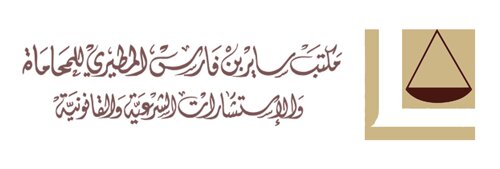
Best Inheritance Law Lawyers in Jeddah
Share your needs with us, get contacted by law firms.
Free. Takes 2 min.
List of the best lawyers in Jeddah, Saudi Arabia

1. About Inheritance Law in Jeddah, Saudi Arabia
In Jeddah, like the rest of Saudi Arabia, inheritance matters are governed by Islamic law (Sharia) as applied by the Saudi judiciary. There is no separate, codified “Inheritance Law” statute for all cases; instead, the distribution of a deceased person’s assets follows Quranic rules and Saudi court procedures. The framework emphasizes fixed shares for spouses, children, parents and certain other relatives, with a limited role for a bequest (wasiyah) that cannot override those fixed shares.
Estate administration typically begins after death with identifying heirs, inventorying assets, settling debts and expenses, and then distributing the remaining estate according to shares prescribed by Sharia. Real estate, bank accounts, and other assets in Jeddah are processed through local courts and notaries under Ministry of Justice guidance. A clear understanding of who counts as an heir and what share is due helps prevent disputes and delays.
Because assets in Saudi Arabia are often a mix of real property, bank accounts, and family-owned businesses, many cases require careful coordination among family members, executors, and courts. In Jeddah, as in other major cities, courts have increasingly emphasized formal documentation and timely processing of inheritance matters. This guide provides practical steps and considerations for residents and expatriates with Saudi assets.
Note: This overview does not replace personalized legal advice. For official processes and forms, consult the Saudi Ministry of Justice resources and local counsel. See the Ministry of Justice site for estate-related procedures and registrations: Ministry of Justice, and the Saudi government portal for public guidance: My.gov.sa.
2. Why You May Need a Lawyer
Inheritance disputes and procedures in Jeddah often involve intricate relations, assets, and timing. A qualified lawyer helps ensure compliance with Sharia rules and local court expectations. Below are real‑world scenarios where legal counsel is typically essential.
- Scenario 1: You are an heir in a decedent’s estate with a mix of real estate in Jeddah and foreign assets. A lawyer coordinates asset inventory, debt settlement, and the court steps needed to transfer titles to rightful heirs.
- Scenario 2: There is a contested will or a claim that fixed shares are not being honored. A Saudi attorney can present evidence, handle negotiations, and represent you in probate hearings.
- Scenario 3: The decedent left a wasiyah (bequest) that appears to exceed the 1/3 limit or conflicts with fixed shares. A solicitor can determine legitimacy, prepare the correct documentation, and obtain court authorization if needed.
- Scenario 4: You are an expatriate with estate assets both inside Saudi Arabia and abroad. A local attorney coordinates cross-border probate issues and ensures asset transfers comply with Saudi rules and foreign laws.
- Scenario 5: Minor heirs or a guardian needs appointment. A legal counsel helps petition the court for guardianship orders and oversight of minor inheritances.
- Scenario 6: Debts and creditor claims affect the estate. A lawyer ensures debts are paid in the correct order and that distributions to heirs follow the law and court orders.
3. Local Laws Overview
Saudi inheritance practice rests on Islamic law as implemented by the Saudi judiciary. Several key concepts and procedural elements shape how cases are handled in Jeddah:
- Quranic shares (An-Nisa and related texts) - The fixed portions for spouses, children, parents and certain relatives determine who inherits and how much. The law applies uniformly in Saudi courts, regardless of the deceased's nationality or residence.
- Wasiyah (bequest) rules - A will may allocate up to one third of the estate to non-heirs, but cannot violate fixed shares for heirs. The remaining two-thirds are governed by the fixed shares without modification.
- Ministry of Justice procedures for estate settlement - Probate, estate certification, and title transfers are processed through Saudi courts and notary offices under the supervision of the Ministry of Justice. This includes asset valuation, debt settlement, and the formal distribution order.
Saudi inheritance follows Sharia principles with court-supervised probate to ensure fair and lawful distribution among heirs.
Recent modernization efforts in Saudi administration aim to improve the efficiency of wills and probate by expanding online services and formalizing documentary requirements. For official guidance and forms, refer to the Ministry of Justice and the national government portal cited above. For a broader legal overview of Saudi inheritance concepts, see the Law Library of Congress overview: Law Library of Congress - Saudi Arabia inheritance and family law overview.
4. Frequently Asked Questions
What is the basis for inheritance in Jeddah?
Inheritance follows Islamic law as applied by Saudi courts, with fixed shares for certain heirs and limits on bequests to non-heirs. The court system administers estates through probate and title transfers.
How do I start an inheritance case in Jeddah?
Begin by gathering death certificate, heirs documents, asset lists, and debt records. Consult a licensed Saudi attorney to file the petition with the local court and coordinate with the Ministry of Justice for probate.
What documents will a lawyer ask for in my case?
Expect to provide death certificate, proof of heirs, marriage and birth certificates, property deeds, bank statements, debts, and asset valuations. The attorney will tailor requests to your situation.
How much do inheritance legal services cost in Jeddah?
Costs vary with case complexity and asset volume. A lawyer may charge a fixed fee or hourly rates; there is typically an upfront consultation fee. You should obtain a written estimate before engagement.
Do I need a local Saudi attorney or can I hire an expat attorney?
Most probate matters require local licensure and familiarity with Saudi court procedures. A local attorney can operate as your lead counsel while coordinating with foreign or expatriate advisers if needed.
How long does an ordinary inheritance case take in Jeddah?
Simple estates may take several months; more complex cases, especially with real estate or cross-border assets, can extend to a year or more. Timelines depend on court calendars and document availability.
What is Wasiyah and when does it apply?
Wasiyah is a bequest that may allocate up to one third of the estate to non-heirs. The remaining two thirds are distributed according to fixed shares for heirs under Sharia.
Can I challenge a will or a distribution order?
Yes, you can contest a will or distribution order through the court system. A lawyer will help gather evidence, present arguments, and represent you in hearings.
Is there a difference between an attorney and a solicitor in Saudi inheritance cases?
English terminology varies; in Saudi Arabia the appropriate professional is typically a licensed attorney or legal counsel. Ensure your adviser is licensed to practice in Saudi courts.
Do I need to prove relationships to be considered an heir?
Yes. The court must verify relationships such as parent-child and marriage connections. This often requires birth certificates, marriage certificates, and other official documents.
What if the deceased had assets abroad as well as in Jeddah?
A cross-border scenario requires coordinating probate and asset transfer across jurisdictions. A local Saudi attorney can handle Saudi assets while coordinating with foreign counsel for international assets.
Are there steps to prevent future inheritance disputes?
Documenting heirs and assets clearly, obtaining early court guidance, and creating a valid wasiyah within the allowed limit can reduce disputes. A lawyer can help structure these steps properly.
5. Additional Resources
- Ministry of Justice (MOJ), Kingdom of Saudi Arabia - Oversees civil and commercial courts, probate, real estate transfers, and inheritance procedures in Saudi Arabia. Official site: moj.gov.sa
- My.gov.sa - Saudi Government Portal - Central hub for public services and guidance related to legal matters, including estate and probate information. Official site: my.gov.sa
- Law Library of Congress - Saudi Arabia: Inheritance and family law overview - U.S. government legal reference describing the Saudi approach to inheritance and family law. Official page: loc.gov
6. Next Steps
- Identify your objective and gather all relevant assets and heir information. Set a realistic timeline with your lawyer.
- Consult a licensed Saudi attorney who specializes in inheritance and family law. Schedule an initial in-person or virtual meeting within 1-2 weeks.
- Have your attorney assess whether there is a valid will (wasiyah) and review fixed shares under Sharia for all heirs. Obtain a preliminary plan of action.
- Collect and organize documents to support the case: death certificate, heir proofs, asset deeds, bank statements, and debt records. Prepare copies for submission to the court.
- Submit the probate petition with the local court and coordinate with the Ministry of Justice for estate certification and transfers. Expect follow-up requests and potential court hearings.
- Address cross-border issues early if foreign assets exist. Your attorney should coordinate with foreign counsel and relevant authorities for seamless asset transfer.
- Maintain clear communication with heirs and document all steps to minimize disputes. Revisit the plan if family circumstances change or new assets appear.
Lawzana helps you find the best lawyers and law firms in Jeddah through a curated and pre-screened list of qualified legal professionals. Our platform offers rankings and detailed profiles of attorneys and law firms, allowing you to compare based on practice areas, including Inheritance Law, experience, and client feedback.
Each profile includes a description of the firm's areas of practice, client reviews, team members and partners, year of establishment, spoken languages, office locations, contact information, social media presence, and any published articles or resources. Most firms on our platform speak English and are experienced in both local and international legal matters.
Get a quote from top-rated law firms in Jeddah, Saudi Arabia — quickly, securely, and without unnecessary hassle.
Disclaimer:
The information provided on this page is for general informational purposes only and does not constitute legal advice. While we strive to ensure the accuracy and relevance of the content, legal information may change over time, and interpretations of the law can vary. You should always consult with a qualified legal professional for advice specific to your situation.
We disclaim all liability for actions taken or not taken based on the content of this page. If you believe any information is incorrect or outdated, please contact us, and we will review and update it where appropriate.











